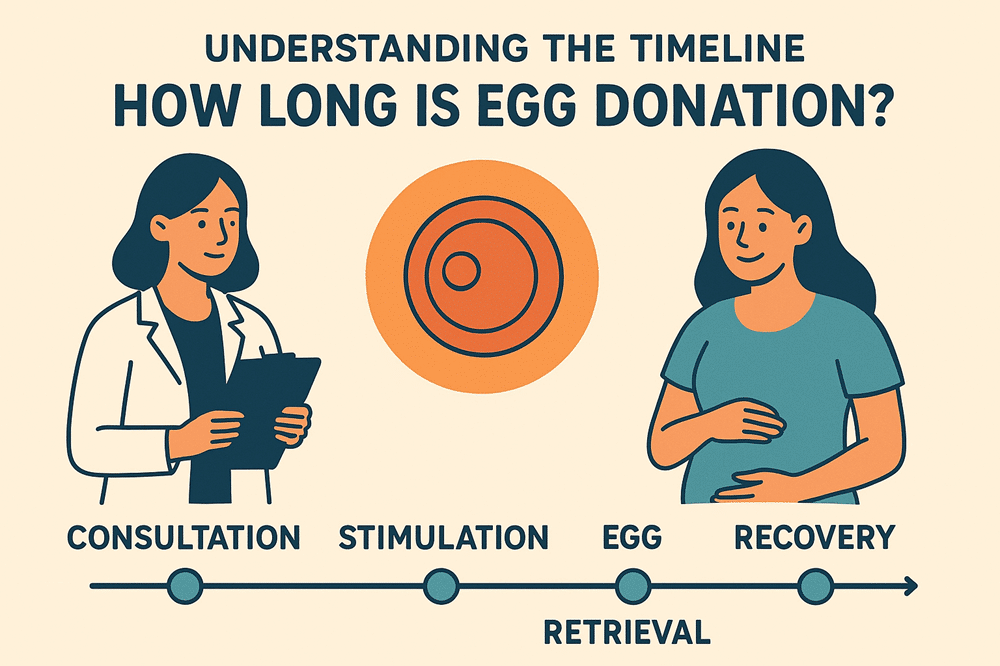The egg donation procedure is an enriching procedure, but the majority of us wonder: how long does the egg donation process last? Having the facts can ease your mind and help you prepare. If you just want to know or are ready to start, this guide will walk you through everything you need to know about the egg donation procedure, such as timelines, steps, and what to anticipate.
What is the Egg Donation Procedure?
The egg donation procedure is a tightly controlled medical procedure in which a woman gives her eggs to help others get pregnant. They are utilized for assisted reproductive therapy like IVF (in vitro fertilization). The method includes medical screening, hormone treatment, egg retrieval, and recovery. It’s an organized process designed to bring safety, health, and success to donor and recipient alike.
How Long is the Egg Donation Process?
The whole egg donation process normally takes 6–10 weeks from start to finish. Here’s why:
Application and Screening (2–3 Weeks)
After you’ve applied, you’ll be given initial health tests, interviews, and genetic screening. All of this is done to make sure that you’re a good candidate to be a donor and that you follow all clinic policies.
Matching with Intended Parents (Varies)
Once approved, the clinic begins looking for an egg donor match. This may be done immediately or may take several weeks based on preference and availability.
Medical Prep and Hormone Treatment (2 Weeks)
You will then start hormone injections to stimulate eggs to mature. Monitoring is done daily to ensure everything is working safely and as planned.
Egg Retrieval Procedure (1 Day + 1–2 Days Rest)
The actual egg retrieval is a short outpatient process that lasts only 20–30 minutes. Sedation is used lightly, and donors usually recover in 1–2 days.
Follow-Up and Recovery (1 Week)
Final visits are done to see whether your body is recovering well. Most donors resume their normal activity within a few days after retrieval.
So, how long is the egg donation process? On average, approximately 2 months from the initial application to recovery.
How to Be an Egg Donor
Want to help someone build a family? Here’s how to become an egg donor:
- Apply with a licensed fertility clinic or egg bank
- Undergo medical and psychological screening
- Provide information about your background and health history
- Begin the egg donation procedure when matched. You’ll receive support and guidance every step of the way.
Egg Donor Compensation
Becoming an egg donor is a generous act, but it also comes with egg donor compensation. Most clinics offer between $5,000 $10,000 per cycle, depending on:
- Your location
- Prior donation experience
- Clinic or agency
- Demand for your profile
This. It’s reimbursement for your time, effort, and travel if necessary. It’s a flat fee per cycle of donation, regardless of how many eggs are harvested.
Egg Donor Success Rates
Success with a donor egg cycle relies highly on the recipient’s health as well as egg quality. Egg Donor Success Rates across the country are between 50% and 75% per cycle. Younger and healthier donors greatly improve the chances of higher success rates. Screening and matching are therefore so important to IVF clinics and intended parents.
Why Intended Parents Look for Egg Donors
A number of individuals and couples cannot utilize their own eggs due to:
- Lower fertility with age
- Genetic disorders
- Medical illnesses, such as chemotherapy
- Single fathers or same-sex male couples
When looking for an egg donor, they desire a healthy, reliable, and compassionate person. Your contribution could be the difference for someone’s journey to being a parent.
What to Expect Emotionally and Physically
Emotionally, donors often feel an amazing feeling of fulfillment. You’re actually creating life and providing the individual with a chance at family.
Physically, the hormone injections may produce temporary side effects like bloating or mood swings. The actual egg donation procedure itself is short, and recovery is often rapid.
Clinics provide full support, counseling, and attention throughout your donation process.
Is Egg Donation Right for You?
Not everybody will be eligible, but if you are in good health and between the ages of 19 to 30, then maybe you are.
Common requirements include:
- Regular monthly periods
- No drug taking or smoking
- Healthy mind and body
- No severe inherited illness
Clinics would like their donors to be responsible, truthful, and committed. Your donation is respected and treated with the respect it deserves.
Trusted Support, Every Step of the Way
If you are thinking about the gift of donation, use a legitimate clinic that is interested in your time, your well-being, and your privacy. At Indian Egg Donors, they walk you through each step of the egg donation procedure, from contact to after-retrieval care.
To begin your journey or speak with a coordinator, please go to www.indianeggdonors.com or call (212) 661-7177 today.
FAQs
Q. How long is the egg donation process from start to finish?
Ans : The whole egg donation process typically lasts between 6 to 10 weeks from application to screening, hormone treatment, egg retrieval, and follow-up care.
Q. Does the egg donation procedure hurt?
Ans : There is minimal discomfort with hormone treatment for most donors. Egg retrieval is done under sedation, and recovery is quick and uncomplicated.
Q. Can I work during the donation process?
Ans : Normal activities can be resumed except for the time spent during retrieval. Some minor activity during hormone treatment and recovery is advisable.
Q. How many times can I donate eggs?
Ans : Clinics will allow a maximum of six cycles, based on your health, results, and choice.
Q. Will egg donation affect my fertility?
Ans : No, egg donation won’t reduce your opportunities to give birth to biological children later. It utilizes eggs that your body would have otherwise wasted.
Q. Do I need health insurance to donate?
Ans : No, the clinic covers all the medical costs associated with the procedure. You will not need to utilize your own personal insurance.
Q. How do I apply to become an egg donor?
Ans : Fill in an online application with a registered clinic or Egg Donor Bank. You will be contacted for screening and the next steps if accepted.
Conclusion
The egg donation procedure may seem complex at first, but with good information and guidance, it is a seamless and empowering process. Having knowledge of how long the egg donation process takes prepares you and helps you make informed decisions.
For many families, your donation will be the difference. If you are new to being a donor or a donor in the future, you are already giving back. Start now with Indian Egg Donors or call 212 661-7177 for information.

Dr. Kulsoom Baloch
Dr. Kulsoom Baloch is a dedicated donor coordinator at Indian Egg Donors, leveraging her extensive background in medicine and public health. She holds an MBBS from Ziauddin University, Pakistan, and an MPH from Hofstra University, New York. With three years of clinical experience at prominent hospitals in Karachi, Pakistan, Dr. Baloch has honed her skills in patient care and medical research.










